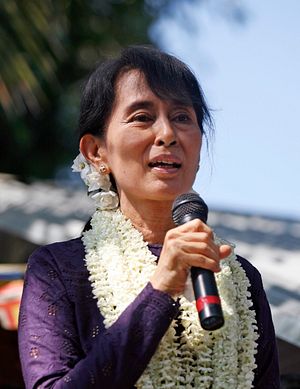Post-election horse-trading has begun in earnest in Myanmar, hinting at the contours of a new power-sharing arrangement between elected and military forces.
As National League for Democracy leader Aung San Suu Kyi holds private meetings with senior military leaders, including an unprecedented session with influential former dictator Senior General Than Shwe, questions are rising about how much the pro-democracy icon must give in order to take power peacefully when the incumbent military-backed government’s term ends in March 2016.
In the wake of the NLD’s resounding November 8 election win, Suu Kyi has held what she has referred to as “reconciliation” talks with top generals, including one-on-one meetings with President Thein Sein, military commander-in-chief Senior General Minh Aung Hlaing and parliament speaker Shwe Mann. Suu Kyi’s symbolic meeting with Than Shwe, the former junta leader who held her under house arrest for 15 out of 21 years and presided over massive human rights abuses, has eased fears that the military may refuse to step down, as they did in annulling the 1990 election result won similarly by the NLD.
According to local reports quoting his grandson, Than Shwe said “everyone” must accept Suu Kyi as the country’s “future leader.” “I will support her earnestly as much as I can if she really works for the development of the country,” Than Shwe said after a two-hour meeting on December 4. Those comments, posted to his grandson’s Facebook page, hint that Than Shwe may order the military’s 25 percent bloc in parliament to repeal a constitutional provision that bars Suu Kyi from the presidency because her sons are foreign nationals. Suu Kyi has repeatedly stated her intention to dodge the provision and rule from “above” the president.
While Suu Kyi’s overtures are still in a trust-building phase, it’s clear that military leaders want private assurances that Suu Kyi will not pursue criminal prosecutions for the previous junta’s and current quasi-civilian administration’s well-documented abuses and atrocities. Than Shwe’s grandson posted a statement with the alleged consent of both Suu Kyi and Than Shwe saying the military’s refusal to transfer power in 1990 was due to an “absence of trust” in the NLD. Hinting at a mea culpa, it also acknowledged that the country “suffered for more than 25 years” under military rule and international sanctions.
A NLD co-leader’s reference to a “Nuremberg-style” tribunal in a foreign media interview given in the aftermath of the party’s landslide 1990 election win is often cited as the real reason that the military refused to relinquish power. Suu Kyi has maintained since last month’s election that the NLD will not adopt a revenge mentality, signaling to the generals that she will not seek criminal retribution despite the decades of harsh persecution she and her party members faced under military rule. Legal analysts reckon Than Shwe, 82, would be the top target in any hypothetical truth and reconciliation court proceedings.
Rights groups hope that the NLD will pursue rule-by-law justice for the military’s many past crimes, including brutal crackdowns on street demonstrators in 1988 and 2007, war crimes committed during various counter-insurgency operations, abuse including torture of political prisoners, and persecution of ethnic Rohingya Muslims, which Yale Law School analysis suggests may legally constitute genocide. Other advocates want the NLD to expose, punish, and where possible reverse the military’s economic corruption, including an opaque privatization process in recent years that handed valuable state assets and lands to influential soldiers.
Others are calling for a more measured approach between revenge and avoidance. The International Center for Transitional Justice, a U.S.-based group that assists countries emerging from repressive rule or armed conflict in pursuing accountability, wrote in a recent report that there is a common misunderstanding among Myanmar’s political elites that transitional justice means revenge and/or only criminal justice, and that there are a range of viable options for addressing the past that do not necessarily entail stripping top generals of their finances, security, and well-being.
Middle path proposals advocated by local civil society groups include calls for the government to acknowledge and apologize for past abuses, pay reparations to victims, and allow for “truth-telling” in areas devastated by armed conflict, the ICTJ report said. None of those reconciliation remedies gained traction during Thein Sein’s quasi-civilian rule, apart from a limited measure of truth-telling allowed through eased censorship of the media since 2012. Journalists who have dared to report critically on the military, however, have faced severe repercussions, including death in custody and lengthy prison sentences.
How Suu Kyi balances the competing imperatives of reconciliation and stability will largely define the former Nobel Peace Prize winner’s legacy as a democratic reformer. With control over the defense, home, and border affairs ministries, 25 percent of parliament’s seats, and the legal shield of a constitutional amnesty for acts committed by current and previous governments, the military retains significant means to thwart any moves the NLD may initiate to address the past. If the military, spurred by Than Shwe, agrees to change the charter and allow Suu Kyi to become president, some analysts already sense she will reciprocally prioritize forward rather than backward-looking reconciliation measures.
“Unless the military refrains from blocking measures to address the past and perhaps even actively decides to support them, governments will continue to be restrained in what they can accomplish,” the ICTJ report said. “The next government…will have to walk a delicate balance with the military in order to govern effectively, constrained in part by the military’s fear of retribution for the past. There is a risk that this balancing act will lead to an agreement to leave the past unaddressed, and in fact NLD leader [Suu Kyi] has recently implied that such an arrangement is acceptable to her.”































